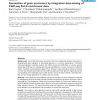Free Online Productivity Tools
i2Speak
i2Symbol
i2OCR
iTex2Img
iWeb2Print
iWeb2Shot
i2Type
iPdf2Split
iPdf2Merge
i2Bopomofo
i2Arabic
i2Style
i2Image
i2PDF
iLatex2Rtf
Sci2ools
BMCBI
2010
2010
Annotation of gene promoters by integrative data-mining of ChIP-seq Pol-II enrichment data
Background: Use of alternative gene promoters that drive widespread cell-type, tissue-type or developmental gene regulation in mammalian genomes is a common phenomenon. Chromatin immunoprecipitation methods coupled with DNA microarray (ChIP-chip) or massive parallel sequencing (ChIP-seq) are enabling genome-wide identification of active promoters in different cellular conditions using antibodies against Pol-II. However, these methods produce enrichment not only near the gene promoters but also inside the genes and other genomic regions due to the non-specificity of the antibodies used in ChIP. Further, the use of these methods is limited by their high cost and strong dependence on cellular type and context. Methods: We trained and tested different state-of-art ensemble and meta classification methods for identification of Pol-II enriched promoter and Pol-II enriched non-promoter sequences, each of length 500 bp. The classification models were trained and tested on a bench-mark dataset...
| Added | 08 Dec 2010 |
| Updated | 08 Dec 2010 |
| Type | Journal |
| Year | 2010 |
| Where | BMCBI |
| Authors | Ravi Gupta, Priyankara Wikramasinghe, Anirban Bhattacharyya, Francisco A. Perez, Sharmistha Pal, Ramana V. Davuluri |
Comments (0)

